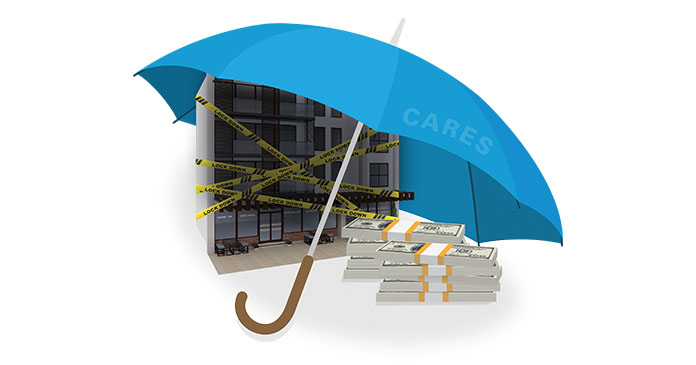It has been about three months since the COVID-19 emergency was declared by President Donald Trump. It’s still too early to fully understand its impact on multifamily real estate, but matters should become clearer once June rents come due.
Asset types and classes are expected to be affected differently, and much will depend on the scope and type of governmental aid offered to residents.
What is currently known, however, is that the $2.2 trillion stimulus bill known as the Coronavirus Aid, Relief and Economic Security Act, signed into law on March 27, includes two provisions that directly affect owners and managers of multifamily properties: certain forbearance rights under federally backed loans and a temporary moratorium on certain residential eviction filings.
In addition to the federal moratorium under the CARES Act, many state and local jurisdictions have passed their own moratoria (or other tenant protections) on evictions and the imposition of penalties associated with the late payment of rent (the vast majority of which are limited to residential leases).
Loan forbearance
Section 4023 of the CARES Act provides multifamily borrowers with the right to request forbearance if the loan is a federally backed mortgage loan (such as U.S. Housing and Urban Development, Freddie Mac or Fannie Mae). The loan must be secured by a lien on residential multifamily real property with five or more dwelling units, and the borrower must be experiencing financial hardship related to the COVID-19 emergency. The loan must be current as of Feb. 1.
However, the term forbearance is not defined. So it is unclear whether it applies only to debt service, or also includes reserves for items such as capital improvements, taxes and insurance. Additionally, the term financial hardship is not defined. The requisite documentation is not specified. It remains to be seen whether specific debt service thresholds will be imposed as forbearance programs are implemented.
Before requesting forbearance, borrowers should confirm whether admitting financial hardship will trigger negative consequences under loan documents, guaranties or partnership agreements. Forbearance can last 30 to 90 days if a borrower exercises certain extension rights by applicable deadlines.
The right to request a forbearance expires upon expiration of the covered period, which ends on the earlier of: the date the COVID-19 emergency terminates and Dec. 31, 2020.
It is unclear whether an unexpired 30-day forbearance period will continue beyond the expiration of the covered period. Accordingly, it is prudent to request relief earlier than later. However, since the moratorium on evictions may extend beyond the forbearance period (depending on when forbearance is requested), borrowers should consider timing their forbearance request so that the 90-day forbearance period and applicable moratorium expire concomitantly, if possible.
By seeking forbearance too soon, borrowers potentially could exhaust their 90-day forbearance period while they still are prohibited by the CARES Act from exercising remedies for nonpayment.
For the duration of the forbearance, borrowers may not evict or initiate evictions solely for nonpayment or charge any late fees or similar penalties. Additionally, borrowers may not issue a notice to vacate until after expiration of the forbearance or require a tenant to vacate on less than 30 days’ prior written notice. Borrowers may discontinue the forbearance at any time; however, it is unclear whether a borrower may resume forbearance after it is discontinued.
It is not specified whether a borrower may deliver a notice to vacate immediately upon discontinuance or must wait until the initial expiration date of the forbearance.
Residential eviction moratoria
Section 4024 of the CARES Act provides a temporary moratorium on eviction filings against residential tenants, with or without a lease, if the property participates in a qualified housing program for domestic violence victims or the rural housing voucher program; or has a federally backed mortgage loan, as described above. The moratorium began on March 27 and expires after 120 days.
The moratorium not only precludes eviction proceedings, but also prohibits landlords from charging fees or other penalties for nonpayment of rent. Landlords still may evict for other reasons (such as illegal activity), subject to restrictions under state and local law.
Uncertainty. Unfortunately, at the time of publication, there remain more questions than answers (not only with respect to the legal issues, but also with respect to the fundamental economics that support the operation and development of multifamily properties).
Will residential tenants be able to pay rent in the coming months? Will there be absorption sufficient to justify development of new projects? What requirements will lenders impose going forward? Maybe a better question is whether debt with palatable terms will be available? These are all unknowns, and only time will tell.
Excerpt Hirsch L. Neustein, associate; Rick D. Thomas, shareholder; Ashley B. Wingfield, shareholder; Brownstein Hyatt Farber Schreck LLP.










